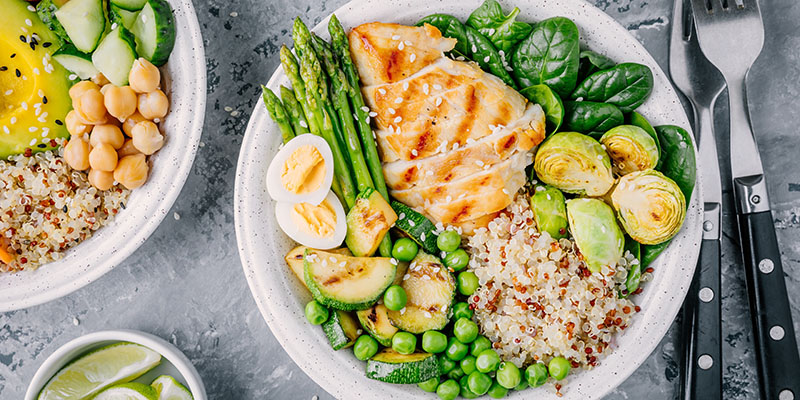We are celebrating body positivity here at Healthworks through the month of March! In a culture where the traditional standards for women are both lofty and narrow, it’s crucial to remind ourselves that we do not have to change our bodies to fit that ideal (thin, muscular, and curvy all at once). We are genetically different and it’s more normal to have variations in our bodies than for us all to look the same! Tall, short, thin, fat, injured, sick, able-bodied – they all have been on long journeys and deserve love.
Gentle Nutrition: An Approach That Supports Body Positivity
But where does nutrition fit in?
We often tie food into how our body looks, and manipulate our food intake to change the shape of our bodies. But if we are trying to respect and love our body for what it is, and want to restore a healthy relationship with food that’s separate from what we look like, does that mean cravings will give in and health is completely out the window?
Not exactly.
Gentle nutrition is one principle of a non-diet approach to food called Intuitive Eating. Intuitive Eating is a model designed by two dietitians who spent their early careers helping people lose weight. After many years, both realized that many of their clients were not having success with weight loss, and in the process were developing very complicated and sometimes damaging relationships with food.
Elyse Resch and Evelyn Tribole designed an entire curriculum to help people restore a healthy relationship with food. The goal is to trust our bodies again, which for decades diet culture has told us we should never do. Resch and Tribole, after looking at years of scientific data, argue that in actuality many of us achieve a more optimal body composition when our complicated relationships with food are resolved.
If you’re interested in showing your body, even more, love and respect this month, here are a few ways to dial into a more loving and compassionate relationship with nutrition that supports your overall health and exercise performance.
Remember your basic tenants of good nutrition.
Scientific consensus shows that there are a few guidelines to follow to make sure you’re getting all the vitamins, minerals, fiber, and macros you need to function optimally. Here they are:
– Make at least half your grain servings whole grains
– Aim for a mix of animal- and/or plant-based proteins
– Aim for at least 5 servings combined of fruits and veggies daily
– Get at least 3 servings of high-calcium foods, such as dairy products, tofu, or fortified products
– Aim for a mix of animal- and/or plant-based fats
Keep these in mind and your body will get all the love and tender care it needs daily for healthy skin, nails, immunity, weight, and muscle growth.
Bust the myth of perfection.
In a social media atmosphere where foods are talked about in moral terms of “good,” “bad,” “sinful,” or “guilty pleasures,” it can be easy to develop the belief that if all your food choices are not exactly as stated above then you’re somehow getting nutrition wrong. I am happy to tell you that’s not true!
Consider research studies in which participants eat a particular diet with the goal to achieve weight loss or performance goals. Typically researchers define success as following the diet 75-80% of the time. That is not perfection, but scientifically it’s enough to warrant results!
Always remember that health and body composition are not dictated by any one choice. They are a constellation of positive habits you practice regularly: nutrition, exercise, stress management, healthy relationships, rewarding work, good boundaries, and so on. Aiming for perfection in any one area will impact the others, and ultimately work against you.
Confront your cravings.
What’s your “guilty pleasure” of choice? If you feel like you have any “sometimes” or “never” foods, imagine eating that food every single meal of the day for as long as you possibly can. How long do you think it will take to get sick of it? Imagine literally filling your fridge or cabinets with that food. How much of it can you possibly eat?
Realize that eating that food every meal, every day, for as long as you could before your body and your brain got sick of it, would not have a long-term impact on your health or your body composition. Those types of impacts can take months and years to develop.
Deprivation is what breeds cravings; the stricter the deprivation, the more powerful the craving. At some point, after your craving is satisfied and you get to a place where a cookie is just a cookie, and not a “sometimes treat,” your brain will step out of the driver’s seat and your body will move on to crave the other nutrients it needs.
Start the process of allowing those “sometimes” and “never” foods back into your world, embrace that they are a tiny part of a much larger picture, and begin to build a healthier relationship with food and your body.
The takeaway .
Practicing body positive nutrition is about understanding what our body needs and providing it, along with a healthy dose of moderation to continue to enjoy the foods we love. Giving ourselves permission to achieve this starts with accepting that nutrition alone won’t change our body – that is dictated by several factors that all need to be addressed in balance. Take the responsibility of a loveable body away from food and celebrate it yourself, just as it is!









